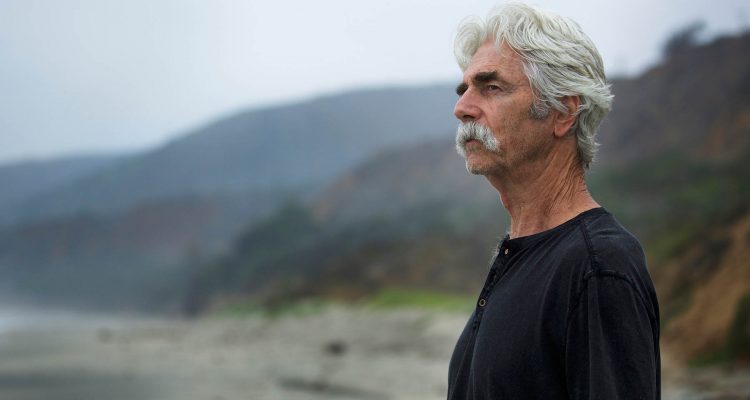Brett Haley’s “I’ll See You In My Dreams” became a Sundance sensation in 2015, a tender and sensitively realized portrait of romance in the golden years, anchored by performances from Blythe Danner and Martin Starr, and a swoon-worthy supporting turn by the perennially appealing Sam Elliott. So it makes perfect sense that Haley’s follow-up feature, “The Hero,” would star Elliott himself.
READ MORE: The 30 Most Exciting Films In The Sundance 2017 Lineup
“The Hero” is Elliott’s best performance in a long time, and possibly ever, as Haley and co-writer Marc Basch have written a role that pushes him beyond his cowboy persona while simultaneously commenting on said persona. We’re introduced to those baritone Elliott pipes as his character Lee Hayden puts in some time in the recording booth, reading ad copy for a barbecue-sauce brand. Lee’s an actor, known best for his film “The Hero” many, many years ago, and struggling to get roles of the same caliber.
He has a strained relationship with his ex-wife Val (Katharine Ross), an art dealer, and his daughter Lucy (Krysten Ritter), who is reluctant to let Lee in after a lifetime of disappointment. His closest relationship is with his drug dealer, Jeremy (Nick Offerman), a former co-star on a Western TV series. His life tumbles along mindlessly in clouds of marijuana smoke and voice-over jobs and reminiscing about the old times.
There are three things that throw Lee off his well-trodden path into an uncertain world of self-reflection and existential contemplation. 1. He has cancer; 2. He meets a girl, Charlotte (Laura Prepon); and 3. He’s being given a Lifetime Achievement award (by a very small-potatoes Western-appreciation outfit). The prospects of death, sex, and career culmination are enough to send anyone into a tailspin, so Lee claims he’s “making a movie” to divert some of the scrutiny away from him.
READ MORE: Review: Fresh And Charming ‘I’ll See You In My Dreams’ Starring Blythe Danner
Elliott is marvelous as Lee, peeling back the tough leather exterior to reveal the softness and vulnerability beneath. He’s especially poignant in his yearning to repair his relationship with his daughter, and in his all-too-humane reactions to rejection. He’s consistent in his striving to be better, even when he fucks up again and again.
Haley uses a Western movie starring Lee as an abstract stylistic and story device throughout the the film. Is it “The Hero,” Lee’s one true classic role, or the film that he says he’s going to make? Or is it the series with Jeremy? It’s all of those things and none at the same time, and never made clear. It’s a way to demonstrate the world in which an actor like Lee (or Elliott for that matter) fits, with all the the pistols, vistas, and cowboy gear, and yet, he doesn’t always fit in everywhere else. It’s a bit too vaguely tied to the narrative and doesn’t come to a definitive conclusion, and is therefore a bit unsatisfying, ultimately.
It bears noting that Prepon and Ritter, with their dyed black manes, bear more than a slight resemblance to each other in the film, which results in some off-putting subliminal connections to be made between Lee’s erstwhile daughter and his new lady love. Fortunately, Haley gets ahead of that issue just a bit when Lee calls out Charlotte after they spend a wild night together at the lifetime-achievement-award ceremony (where Charlotte takes the place of Lucy), questioning her motivations, slightly appalled that she’s the same age as his daughter.
There’s a palpable and sexy physical and mental chemistry between Elliott and Prepon, and though the older man/younger woman coupling is a delicate stereotype to work around, headstrong and mysterious Charlotte holds the strings in their relationship, spinning him around her finger. There’s a bit of a wonky misstep with her character, and though she is redeemed to the characters within the story afterward, it doesn’t totally work, and her arc feels uneven, unfinished.
READ MORE: The 100 Most Anticipated Films Of 2017
This is a film that hangs on the character of Lee and the nuanced, intimate performance by Elliott. The characters around him offer his life color and history and take him through the emotional peaks and valleys that he wouldn’t otherwise travel. But the heart of the matter is in how Lee responds to those around him, how he stretches to meet someone, despite how hard it is, or falls back into bad habits and old ruts. You can’t take your eyes off Elliott, seeing him in ways both warmly familiar but also new and surprising.
The cinematography by Rob Givens, who also shot “I’ll See You In My Dreams,” is particularly lovely, rendering personal foibles into beautiful moments: gauzy, woozy, light-filled drug trips and wild nights out. The present slips seamlessly into and out of the Western fantasy, melding romantic dramedy and the Western into a singular genre.
“The Hero” feels looser, more abstract, and more symbolically ambitious than the winsome “I’ll See You In My Dreams,” and at times you wish for a bit more narrative rigor. But it’s nonetheless a resonant depiction of a man fearlessly reckoning with his life, his image and, most importantly, his heart. Sam Elliott could not be more compelling. As for lifetime achievement awards — if we could give one to Elliott for “The Hero,” it’d be wholly deserved. [B+]
Click here for our complete coverage from the 2017 Sundance Film Festival

